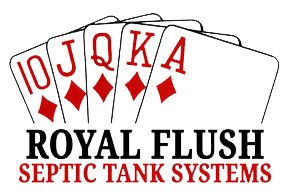The Fundamentals of Septic Systems
 From Texas Commission on Environmental Quality:
From Texas Commission on Environmental Quality:
Site evaluations determine local conditions and the design of OSSFs. In many parts of Texas, soil analyses are ruling out conventional systems where liquids are separated from solids in the septic tank and then spread throughout the drainfield by means of underground pipes or other proprietary products. Organic wastes are treated as the liquids percolate through the soil. But most soils in Texas can’t properly absorb pollutants, so alternative treatment methods are required.
Almost all OSSFs must have a permit prior to any construction, installation, repair, extension, or other alteration. Any work on an OSSF must be performed by a licensed installer or directly by the homeowner. If someone is paid for any part of the process, that person must be licensed by the state.
Who checks to make sure the requirements are followed?
In most areas of the state, local authorities have taken on the responsibility for ensuring that OSSFs in their area comply with all state requirements. Many local governments are “authorized agents” (AA) of the Texas Commission on Environmental Quality for administering the OSSF Program. Many times, the AA has a “designated representative” (DR) to assist them with their responsibilities, which include reviewing plans for constructing, altering, extending or repairing each OSSF; issuing permits; and inspecting system installation. You can search for your local permitting authority online.
local governments are “authorized agents” (AA) of the Texas Commission on Environmental Quality for administering the OSSF Program. Many times, the AA has a “designated representative” (DR) to assist them with their responsibilities, which include reviewing plans for constructing, altering, extending or repairing each OSSF; issuing permits; and inspecting system installation. You can search for your local permitting authority online.
Authorized agents and representatives also respond to complaints to ensure that an OSSF meets minimum standards. If problems are found, the system owner normally has 30 days in which to make substantial progress on remedying the situation. After that, the agent can file a criminal complaint with the local justice of the peace.
OSSFs can handle only domestic sewage. Industrial or hazardous waste will ruin an OSSF by literally killing the bacteria that break down the biosolids. Remember: septic systems are designed to handle human waste, not chemicals.
Maintenance
All OSSFs require maintenance at one time or another. Conventional anaerobic systems need to have the septic tank pumped out to remove the solids and keep the system from backing up. It is recommended that you pump your septic tank every three to five years to prevent short circuiting of the treatment process. Access the Sludge Transporter Query online to obtain a list of registered sludge transporters in your area.
Aerobic systems are more complex and require more maintenance. Some maintenance may be performed by homeowners for systems using secondary treatment or drip irrigation, and surface application disposal. Some permitting authorities have adopted more stringent requirements, which may require homeowner training or even prohibit homeowner maintenance. Check with your permitting authority to find out if it has adopted more stringent requirements. Contracting with a licensed maintenance provider to check, troubleshoot and test the system as required in 30 TAC §285.91(4) will help ensure that the system operates correctly. The maintenance provider inspects components of the system and notes whether or not every component is working during each quarterly site visit. If the system uses an electronic monitor, automatic radio or telephone to notify the maintenance provider of system or component failure and to monitor the amount of disinfection in the system, reporting may be reduced to every six months. The maintenance provider will tell the homeowner of any problems or repairs to be made. Any required repairs that are not made will be reported to the permitting authority.
When disinfection of secondary effluent is required, use a chlorine tablet made from calcium hypochlorite that is certified for wastewater disinfection by EPA. The tablets are very reactive and will kill 99% of the bacteria present in the effluent within 10 minutes. Follow all warning and precaution statements of the chlorine tablet manufacturer to protect yourself and the system equipment. DO NOT USE TABLETS DESIGNED FOR SWIMMING POOL USE AS THESE MAY RELEASE AN EXPLOSIVE GAS CALLED NITROGEN CHLORIDE.
kill 99% of the bacteria present in the effluent within 10 minutes. Follow all warning and precaution statements of the chlorine tablet manufacturer to protect yourself and the system equipment. DO NOT USE TABLETS DESIGNED FOR SWIMMING POOL USE AS THESE MAY RELEASE AN EXPLOSIVE GAS CALLED NITROGEN CHLORIDE.
The TCEQ’s Small Business and Local Government Assistance Section offers free, confidential help to small businesses and local governments working to comply with state environmental regulations. Call us at 1-800-447-2827.
Information for Homeowners
Information for Licensees
Maintenance of On-Site Sewage Facilities (Septic Systems) — Overview of proper On-Site Sewage Facility (OSSF) maintenance, including when maintenance is required and what type of chlorine to use.

 From Texas Commission on Environmental Quality:
From Texas Commission on Environmental Quality: